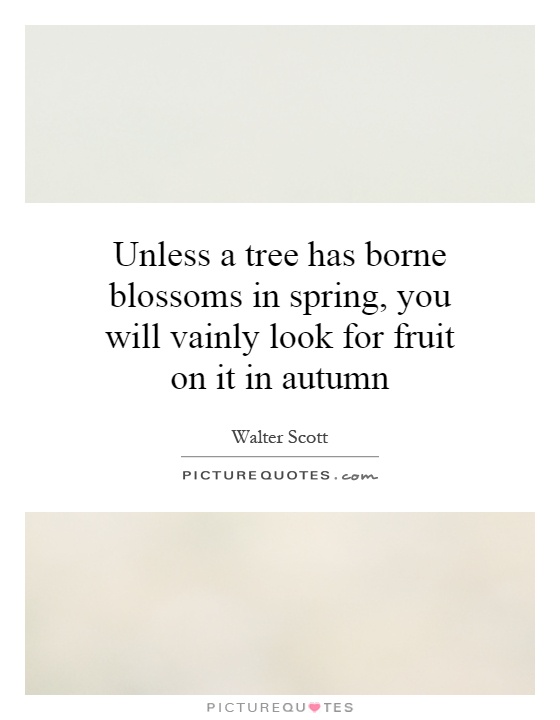Unless a tree has borne blossoms in spring, you will vainly look for fruit on it in autumn

Unless a tree has borne blossoms in spring, you will vainly look for fruit on it in autumn
The quote “Unless a tree has borne blossoms in spring, you will vainly look for fruit on it in autumn” holds a deep and profound meaning when applied to the life and works of the renowned Scottish novelist and poet, Sir Walter Scott. Scott was a literary giant of the Romantic era, known for his historical novels, poems, and plays that captured the imagination of readers around the world. His works are often filled with themes of chivalry, honor, and the beauty of the natural world, making the comparison to a blossoming tree in spring quite fitting.In the context of Scott’s life and career, the quote can be interpreted as a reminder of the importance of laying a strong foundation before expecting to see the fruits of one’s labor. Scott’s literary career was built on a solid base of education, hard work, and a deep love for his native Scotland. He began his writing career as a translator and poet before finding success with his historical novels, such as “Ivanhoe” and “Rob Roy”. These early works can be seen as the blossoms that Scott bore in his literary spring, laying the groundwork for the enduring legacy he would leave behind.
Just as a tree must first bloom in spring before bearing fruit in autumn, Scott’s early works paved the way for the later success and recognition he would achieve. His novels were not only popular with readers of his time but have continued to be celebrated and studied for their rich storytelling, vivid characters, and historical accuracy. Scott’s influence on the literary world can still be felt today, with many modern authors citing him as an inspiration and his works being adapted into films, television shows, and even video games.












 Friendship Quotes
Friendship Quotes Love Quotes
Love Quotes Life Quotes
Life Quotes Funny Quotes
Funny Quotes Motivational Quotes
Motivational Quotes Inspirational Quotes
Inspirational Quotes